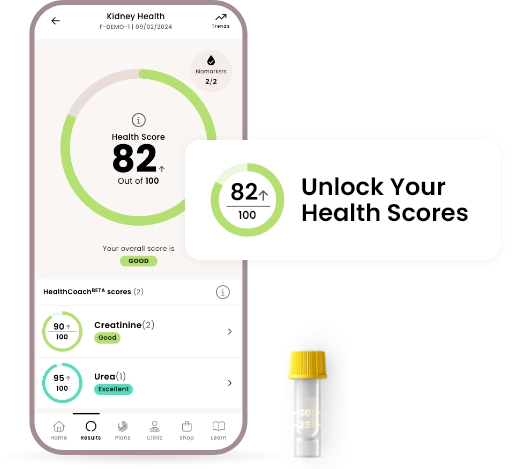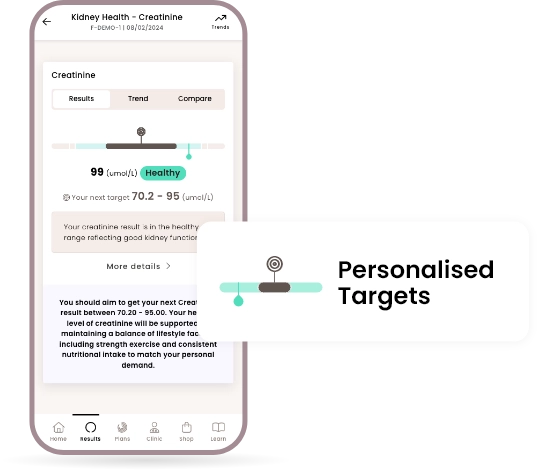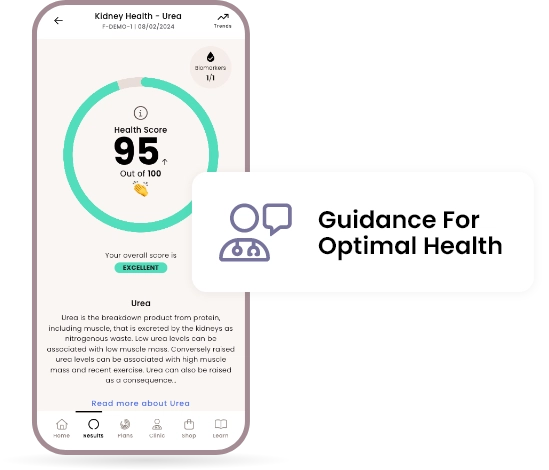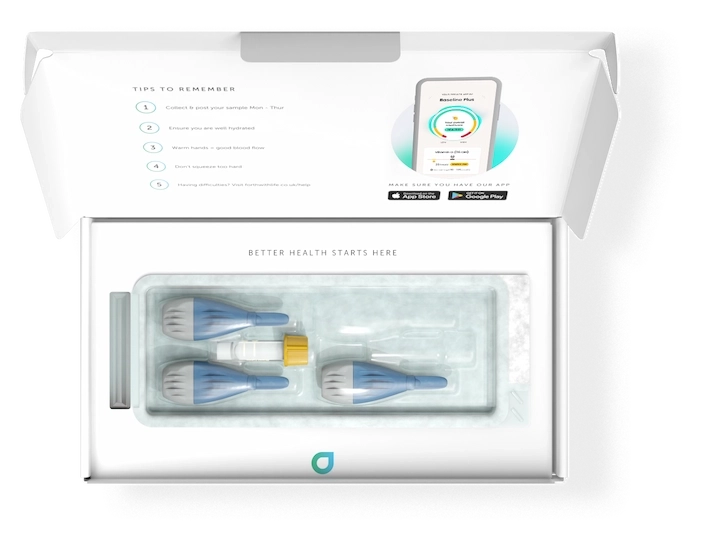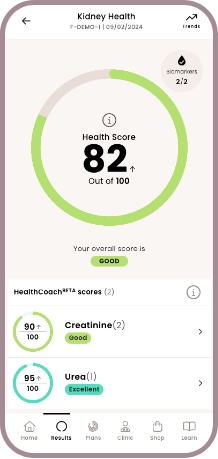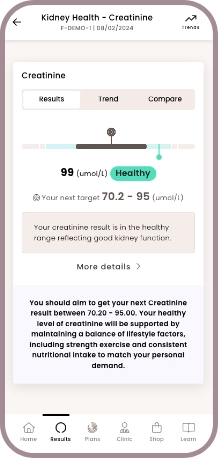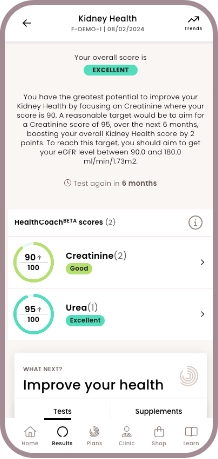About flexible subscriptions
How does a subscription work?
When you purchase this test subscription plan, we will automatically send you another test kit in a few months. Don't worry - you have full control over when this will be, and you can change/cancel it anytime.
When you first purchase this test, you can choose your subscription options in the checkout. We do this, because we recommend taking multiple tests over time to track how your biomarkers change. You'll be charged per test kit (rather than monthly, for example).
Why subscribe to multiple tests?
One test will show you what areas you need to focus on, continued testing will help you learn how your training, diet and lifestyle is impacting your health.
How often should I test?
We recommend a follow up test 3 months after your first test, followed by a test every 6 months depending on your results, but its up to you!
Can I change what's tested in future tests?
Yes, you can tailor/customise subsequent tests (via your app) to focus on just the areas that need improving.
Kidney Function Blood Test
£49
Our Kidney Function home blood test checks key biomarkers that assess the health of your kidneys. It can also help assess your risk of developing kidney disease. The easy to view results will tell you how well your kidneys are functioning, and our doctors will provide advice on any results outside of the normal range.
Validated & analysed by NHS Lab
Tracked 24 delivery
Finger prick or venous collection
Results in 2 working days
Shop now. Pay over time with Klarna
Klarna available at checkout.
Klarna's Pay in 3 / Pay in 30 days are unregulated credit agreements. Borrowing more than you can afford or paying late may negatively impact your financial status and ability to obtain credit. 18+, UK residents only. Subject to status. Ts&Cs and late fees apply.
What gets tested?
10 Biomarkers
Blood sample collection options
How does it work?
When do I take the test?
If you have consumed a large amount of alcohol, we recommend leaving a gap of 72-96 hours before taking this test.
Certified for quality & security
Blood sample collection options
You can choose your preferred collection method when you checkout
Finger prick kit (FREE)
You can do this test at home without the need for a doctor. We'll send you everything you need to collect your sample and post it back to us. And it's all included in the cost. We've put together a video that covers the process, making it easy to check and track your health from home.
Home nurse appointment (+£60)
We'll arrange for a medical professional to visit your home and collect your sample. This is great if you're unsure on how it all works or have trouble collecting a sample. No need to book a doctor's appointment or visit a clinic, we'll send you everything you need to collect a sample and post it back to our labs.
Visit a partner clinic (+£45)
Once you've ordered your test, look out for an email from our phlebotomy partners containing information and a link to book your appointment. We'll send you everything the clinic will need to complete the sample and post it back to our labs.
Organise a nurse myself (FREE)
If none of the above options work for you, you can arrange your own medical professional to collect your sample. There is no additional charge for this. Once you've ordered your test, we'll send you everything you and your chosen medical professional will need to collect a sample and post it back to our labs.
Still unsure how it works? You can find more information on collection methods and the service we provide in our 'How it Works' section.
How does it work?

1. Choose your blood test
No need to wait for a GP appointment, your kit will arrive within 1-2 days, which includes everything you need to collect your blood sample and post it back to our labs.
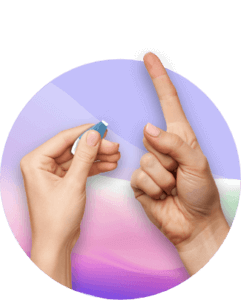
2. Collect your sample
Take your finger prick blood sample at home, or choose to have your blood taken at a Superdrug health clinic or a nurse at home. Return to our NHS lab using our prepaid envelope.
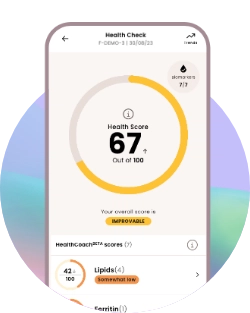
3. View your results
View your results on your secure health dashboard within 2 working days of our lab receiving your sample. Read personalised comments from our GPs.
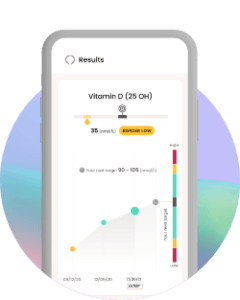
4. Make improvements
With more in-depth results, you will be able to identify areas that need improving. Make the changes and track your progress.
What gets tested?
10 Biomarkers Included
Additional biomarkers can be added by personalising this test.
What are biomarkers?
Biomarkers are specific compounds we can detect in your blood sample that reflect different things about your health. Your test will tell you your levels for each of the above biomarkers, and whether they are in a normal range.
Did you know?
More than 10% of the UK population are living with kidney disease
Kidney Research UK: Report into the economic impact of kidney diseaseUnlock your health scores with HealthCoach™
Powered by cutting-edge technology, Forth’s industry leading app goes beyond reporting basic biomarker results and one-size-fits-all health advice to deliver a comprehensive roadmap to better health.
Your Kidney Function Blood Test will give you the following Health Scores
Liver health
Kidney health
What does a kidney blood test show?
Our kidney blood test will show you a detailed breakdown of your results for each of the biomarkers tested. It will tell you if your results are within the normal range for your age for each biomarker tested. You’ll also receive comments from our team of doctors on any out of range results. It’ll help you understand how well your kidneys are functioning and if you’re at risk of developing kidney disease.
How to test your kidney function at home
Our kidney function blood test is a finger prick test, making it easy to collect your blood sample from home. It comes with everything you need to do the test, including free return postage to our labs for analysis. We’ve put together a full how-to video to help you collect your blood sample.
Frequently asked questions
This is what our customers ask us most about this test. For more information, try our help centre.
What damages the kidneys?
There are many causes of kidney disease. The most common causes in the general population are high blood pressure and type 2 diabetes. Other issues include some long term medications, such as non-steroidal anti-inflammatory drugs like Ibuprofen, and some auto-immune conditions.
How can I improve my kidney function?
It’s really difficult to reverse kidney damage once it has occurred. However, ways to protect yourself from developing kidney damage is to keep well hydrated, regular exercise (to help avoid high blood pressure), stopping smoking, and keeping cholesterol at a healthy level.
What is the first sign of kidney problems?
Kidney disease is often a ‘silent’ problem. Many people don’t know they have a kidney problem until it becomes very severe. This is why it’s worthwhile checking how they’re working, such as with a blood test to check kidney function.
What are kidney stones and how do I prevent them?
Kidney stones are relatively common with an estimated 1 in 10 people experiencing this very painful problem in their lifetime. Kidney stones can develop in 1 or both kidneys and most often affect people aged 30 to 60 years old. Sometimes they can also lead to bladder or kidney infections.
Big stones can cause symptoms, including:
- Pain – mostly in the side or your lower back
- Pain that comes in waves, building to a crescendo then reducing for a period
- Feeling nauseated or vomiting
How soon will the test arrive?
If you order your test before midday on a Monday to Friday then your kit will be dispatched
the same day.
All our kits are sent out via Royal Mail first class post, so it should be with you within 1-2
working days.
How secure is my data?
We have strict processes in place to ensure the protection of your data. Following GDPR the company also operates under tight legal rules about the sharing of data which ensures that data is only shared if it is crucial to the delivery of our service. For example, our doctors see customer results at the time of review, however, after review, access to results is withdrawn.
Learn more about your data security.
Can I have someone take my blood for me?
Yes. We offer two options if you do not want to do our finger prick test. The first is a home appointment where a nurse comes to your home to take a blood sample. The second is to visit a Phlebotomy clinic near you that offers a blood sample service.
A blood sample will be taken from your vein and we will provide you with everything you need to give to the nurse to allow them to take the sample.
The nurse will give you the blood sample to return to us using the pre-paid envelope provided.
Does a doctor review my results?
We have a team of doctors and nurses who look at all results and will comment on any results that are outside of the normal range for your age.
Can I download the results to share with my GP?
Yes, you can download your results from your health dashboard as a PDF to share with your GP.
Learn how to export your results.
We are dedicated to supporting you on improving your health
Go to help center
Kidney Function Blood Test, recommended by our doctors
"A renal function test assesses how well your kidneys are working. It typically involves measuring creatinine and blood urea nitrogen levels in your blood. These values help determine if your kidneys are effectively filtering waste and regulating the balance of fluids and electrolytes in your body. Abnormal results may indicate kidney problems."
Dr Thom Phillips
Similar tests
- Health scores calculated
Close
We're changing people's lives
How our Kidney Function Blood Test works
Getting the insights you need to improve your health has never been easier.

1. Choose your blood test
No need to wait for a GP appointment, your kit will arrive within 1-2 days, which includes everything you need to collect your blood sample and post it back to our labs.

2. Collect your sample
Take your finger prick blood sample at home, or choose to have your blood taken at one of our partner clinics or a nurse at home. Return to our NHS lab using our prepaid envelope.

3. View your results
View your results on your secure health dashboard within 2 working days of our lab receiving your sample. Read personalised comments from our GPs.

4. Make improvements
With more in-depth results, you will be able to identify areas that need improving. Make the changes and track your progress.
What's included in this test?
1x Yellow Tube
3x Lancets

1x Cleansing wipes

Plasters

2x Alcohol swabs
1x Return pouch

1x Tracked 24 return envelope

1x Lab request form
Blood sample kit
Results within 2 working days
Tracked 24 delivery & return
Secure health dashboard
Accredited lab analysis
Doctor reviewed results
Our impact in numbers...
70+
From hormones to nutrients, we offer 70+ different tests
60,000+
We've helped over 60,000 people improve their health
800,000+
We've delivered over 800,000 test results
Related articles
Like this article? Here are some more based on similar topics.
Kidney Function Blood Test

